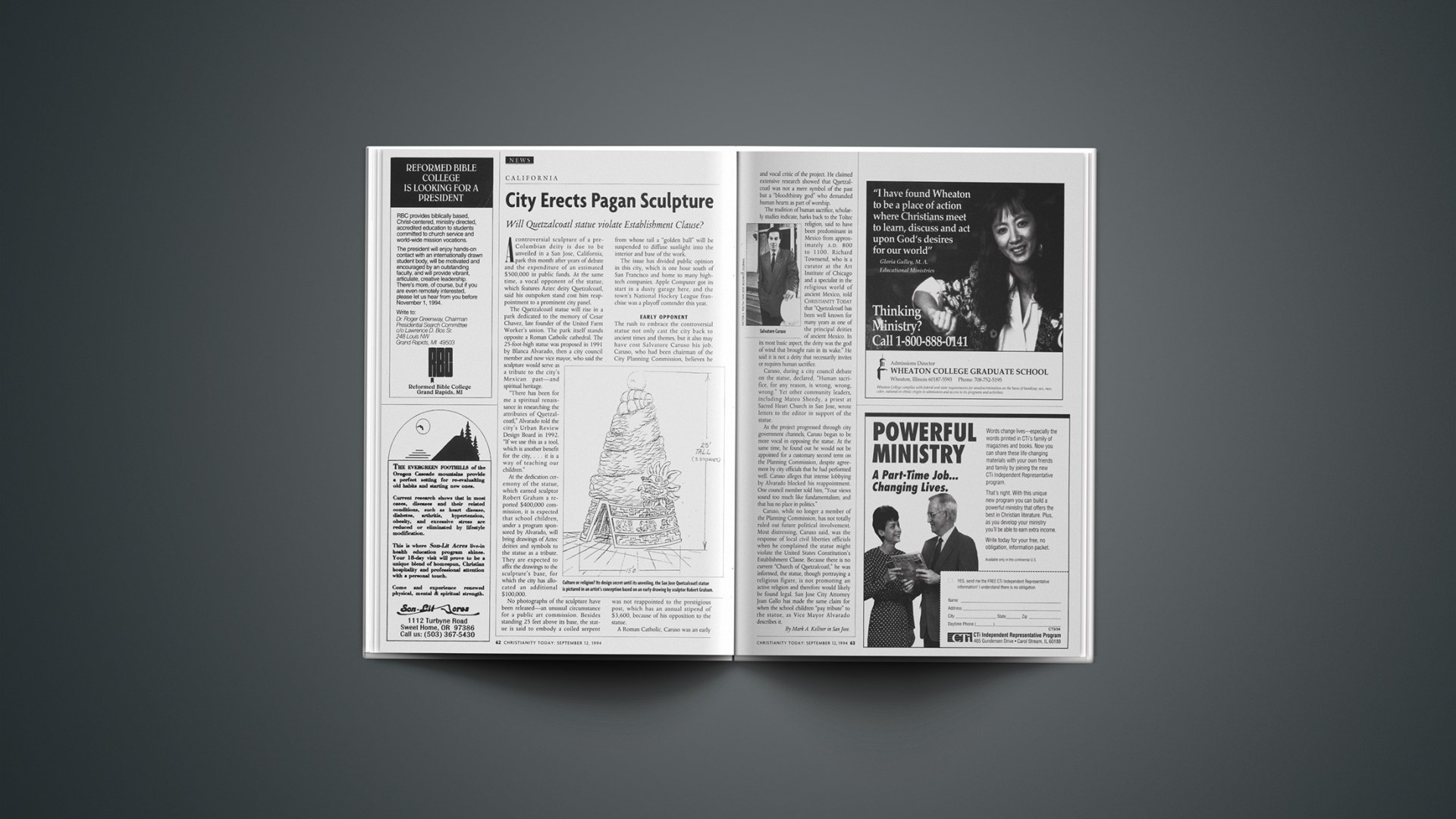A controversial sculpture of a pre-Columbian deity is due to be unveiled in a San Jose, California, park this month after years of debate and the expenditure of an estimated $500,000 in public funds. At the same time, a vocal opponent of the statue, which features Aztec deity Quetzalcoatl, said his outspoken stand cost him reappointment to a prominent city panel.
The Quetzalcoatl statue will rise in a park dedicated to the memory of Cesar Chavez, late founder of the United Farm Worker’s union. The park itself stands opposite a Roman Catholic cathedral. The 25-foot-high statue was proposed in 1991 by Blanca Alvarado, then a city council member and now vice mayor, who said the sculpture would serve as a tribute to the city’s Mexican past—and spiritual heritage.
“There has been for me a spiritual renaissance in researching the attributes of Quetzalcoatl,” Alvarado told the city’s Urban Review Design Board in 1992. “If we use this as a tool, which is another benefit for the city, … it is a way of teaching our children.”
At the dedication ceremony of the statue, which earned sculptor Robert Graham a reported $400,000 commission, it is expected that school children, under a program sponsored by Alvarado, will bring drawings of Aztec deities and symbols to the statue as a tribute. They are expected to affix the drawings to the sculpture’s base, for which the city has allocated an additional $100,000.
No photographs of the sculpture have been released—an unusual circumstance for a public art commission. Besides standing 25 feet above its base, the statue is said to embody a coiled serpent from whose tail a “golden ball” will be suspended to diffuse sunlight into the interior and base of the work.
The issue has divided public opinion in this city, which is one hour south of San Francisco and home to many high-tech companies. Apple Computer got its start in a dusty garage here, and the town’s National Hockey League franchise was a playoff contender this year.
EARLY OPPONENT
The rush to embrace the controversial statue not only cast the city back to ancient times and themes, but it also may have cost Salvatore Caruso his job. Caruso, who had been chairman of the City Planning Commission, believes he was not reappointed to the prestigious post, which has an annual stipend of $3,600, because of his opposition to the statue.
A Roman Catholic, Caruso was an early and vocal critic of the project. He claimed extensive research showed that Quetzalcoatl was not a mere symbol of the past but a “bloodthirsty god” who demanded human hearts as part of worship.
The tradition of human sacrifice, scholarly studies indicate, harks back to the Toltec religion, said to have been predominant in Mexico from approximately A.D. 800 to 1100. Richard Townsend, who is a curator at the Art Institute of Chicago and a specialist in the religious world of ancient Mexico, told CHRISTIANITY TODAY that “Quetzalcoatl has been well known for many years as one of the principal deities of ancient Mexico. In its most basic aspect, the deity was the god of wind that brought rain in its wake.” He said it is not a deity that necessarily invites or requires human sacrifice.
Caruso, during a city council debate on the statue, declared, “Human sacrifice, for any reason, is wrong, wrong, wrong.” Yet other community leaders, including Mateo Sheedy, a priest at Sacred Heart Church in San Jose, wrote letters to the editor in support of the statue.
As the project progressed through city government channels, Caruso began to be more vocal in opposing the statue. At the same time, he found out he would not be appointed for a customary second term on the Planning Commission, despite agreement by city officials that he had performed well. Caruso alleges that intense lobbying by Alvarado blocked his reappointment. One council member told him, “Your views sound too much like fundamentalism, and that has no place in politics.”
Caruso, while no longer a member of the Planning Commission, has not totally ruled out future political involvement. Most distressing, Caruso said, was the response of local civil liberties officials when he complained the statue might violate the United States Constitution’s Establishment Clause. Because there is no current “Church of Quetzalcoatl,” he was informed, the statue, though portraying a religious figure, is not promoting an active religion and therefore would likely be found legal. San Jose City Attorney Joan Gallo has made the same claim for when the school children “pay tribute” to the statue, as Vice Mayor Alvarado describes it.
Copyright © 1994 Christianity Today. Click for reprint information.









